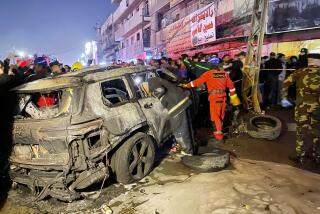Iraqi leader threatens deserters with execution amid militant blitz
Iraq’s prime minister on Saturday threatened his nation’s troops with execution if they had abandoned their posts in the face of a blitz attack by Islamic militants who swept through northern provinces this week.
Speaking to a group of army officers in a televised address from the central city of Samarra, Prime Minister Nouri Maliki promised accountability and punishment for any soldiers who had contributed Tuesday to the swift fall of Mosul, one of the nation’s largest cities, as well as other areas in the country.
Iraqi army and police units offered little resistance to the militants of the Islamic State of Iraq and Syria, in many cases shedding their uniforms and abandoning their equipment as they fled the violence, according to reports.
“Those who did nothing, and those who clearly abandoned their posts, let them not imagine that they escaped to [safety] in the houses of their families and mothers,” Maliki said, adding that those found to have deserted would be prosecuted “to the utmost, with punishments that rise to execution.
“Frankly this was our chance to get rid of those cowards and weaklings,” he added. “This is our opportunity to improve the army and purify it from these elements.”
Maliki arrived in Samarra, about 80 miles north of the capital, on Friday after the government had granted him extensive powers to confront the Sunni Muslim extremists of ISIS. The Al Qaeda splinter group is notorious for its harsh application of Islamic sharia law, employing beheadings, amputations and crucifixions to punish those who contradict its edicts.
In the wake of the security forces’ defeat, Maliki -- a Shiite Muslim accused by critics of marginalizing the country’s Sunni minority -- had called for the creation of local militias, composed of volunteers and organized largely on sectarian lines to confront ISIS, whose forces had taken large areas of northwestern Iraq before moving toward Baghdad.
Samarra would not be the last line of defense but a “launch pad to purify every inch that was sullied by the feet of those traitors,” Maliki said, promising the arrival in the city of “the masses of volunteers who had come to liberate the lands” taken by ISIS.
Meanwhile, insurgents seized the small town of Adeim in Diyala province after Iraqi security forces pulled out, the Associated Press reported, citing the head of the municipal council, Mohammed Dhifan.
State media reported the arrival of thousands of young men to 23 recruitment centers in eight southern provinces, many of them heeding the call of religious leaders such as Grand Ayatollah Ali Sistani, Iraq’s senior Shiite cleric. On Friday, Sistani exhorted followers to “volunteer and join the security forces to achieve this holy purpose.”
With the threat of destruction to Iraq’s tenuous unity looming, Maliki insisted that this was not a sectarian battle and that Iraqis would fight as a nation.
“We will talk the language of justice, we will talk the language of freedom, we will talk the language of all Iraqis regardless of sect,” he said.
It was not clear how much outside help Maliki could expect in confronting ISIS. On Friday, President Obama said that even though “Iraq needs additional support to break the momentum of extremist groups” he would “not be sending U.S troops back into combat” in the country.
Iranian President Hassan Rouhani, in a news conference celebrating one year since his surprise victory in the presidential elections, also expressed his concern for Iraq, saying that “if the Iraqi government asks us for help, we may provide any assistance the Iraqi nation would like us to provide in the fight against terrorism.”
Although he did not specify what form this support would take, the involvement would put the United States in the strange position of working in tandem with a longtime enemy. Iran is viewed with suspicion by many U.S. allies in the region, who fear it is attempting to create a “Shiite crescent” extending its influence to the Mediterranean.
Rouhani dismissed rumors that Iranian forces had been dispatched to fight in Iraq. Earlier in the week, activists had reported Quds Force commander Qassem Suleimani, head of Iran’s elite commando unit, had taken the reins in operational command headquarters in Baghdad.
Bulos is a special correspondent.
More to Read
Start your day right
Sign up for Essential California for news, features and recommendations from the L.A. Times and beyond in your inbox six days a week.
You may occasionally receive promotional content from the Los Angeles Times.







